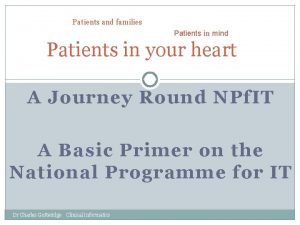Discussing Futility with Patients and Their Families Ira









- Slides: 9

Discussing Futility with Patients and Their Families Ira Bedzow, Ph. D Director Biomedical Ethics and Humanities Program New York Medical College

Learning objectives: After the talk, you should be able to do the following: 1. Compare different definitions of futility 2. Evaluate the benefits and detriments of different definitions of futility 3. Determine situations in which medical care is futile as per different definitions of futility 4. Discuss the disagreements that occur around futility and strategies to mitigate them 5. Embrace the physician's responsibility in determining when treatment is non-beneficent and its importance in patient care

Pre-session Assignments: Readings 1. 2. 3. Swetz KM, Burkle CM, Berge KH, and Lanier WL. Ten Common Questions (and Their Answers) on Medical Futility. Mayo Clin Proc. 2014. 1 -17. Nair-Collins. Laying Futility to Rest. J Med Philos. 2015: 554 -583. Bosslet, GT et al. An Official ATS/AACN/ACCP/ESICM/SCCM Policy Statement: Responding to Requests for Potentially Inappropriate Treatments in Intensive Care Units. Am J Respir Crit Car Med. 2015. 191: 1318 -1330. (Optional) Videos 1. The Ethics of End-of-Life Care

Is Discussing the Concept of Futility a Fool’s Errand? While the concept of futility is about the physician’s role vis-à-vis the patient with respect to withholding/withdrawing end-of-life care – it is in fact one piece of a much larger question. Namely, what are the demarcation lines between physician authority/integrity and patient autonomy?

It seems that shared decision-making should occur for all types of questions regarding healthcare, and the exceptions are also clearly laid out. 1. Pediatrics – Pediatric Assent vs. Parental Consent and Best Interests Standard (Parens Patriae) 2. Incompetent Patients – Substituted Judgment Standard and Proxy Intentions Why are cases of Futility Different?

When Futility is used to justify physician integrity it is by definition one-sided – though it need not be… Before getting into particular definitions, when you look at empirical studies regarding costs of futile care, decisions regarding futile care, and how to have discussions with patients and family-members about futile care, a common presumption – whether it is an accepted premise or whether the article is trying to oppose it – is that determinations of futility are made from the point of view of the physician or the medical team.

History of the Concept & Definitions of Futility: 1. ordinary/extraordinary treatment 2. qualitative futility 3. quantitative futility 4. strict physiologic futility 5. lethal condition futility 6. imminent demise futility 7. AMA’s Process-Based Approach Question: What do you believe is the main benefit and detriment of each of the main definitions of futility from this week? Should there be only one definition of futility? If so, which one and why? If not, why not?

Discussion with Patients and Families: When a futility dispute arises, the nature of the dispute can thus be clarified in terms of the following questions: 1. Is there a dispute about what, in fact, is the true efficacy of a given intervention in light of the goals for administering it? 2. Is there agreement on the efficacy of a given intervention but disagreement about the dividing point for when the probability of effectiveness is in the range of futile and when it is not? 3. Is it a dispute about the appropriate goal of treatment for this particular patient or appropriate goals of health care more generally?

The Language of Futility What do you think about the following terms? What do you think they mean to patient, medical providers, families? 1. Futile Care 2. Medically inappropriate 3. Medically non-beneficial 4. Medically inadvisable
 Little families
Little families Characteristics of logic family
Characteristics of logic family Writing advantages and disadvantages essay structure
Writing advantages and disadvantages essay structure How to start an essay about advantages and disadvantages
How to start an essay about advantages and disadvantages Two technicians are discussing oil and filter changes
Two technicians are discussing oil and filter changes When discussing comparative and absolute advantage
When discussing comparative and absolute advantage Wilfred owen futility summary
Wilfred owen futility summary Structure of dulce et decorum est
Structure of dulce et decorum est The city planners questions and answers
The city planners questions and answers Futility analysis meaning
Futility analysis meaning

















